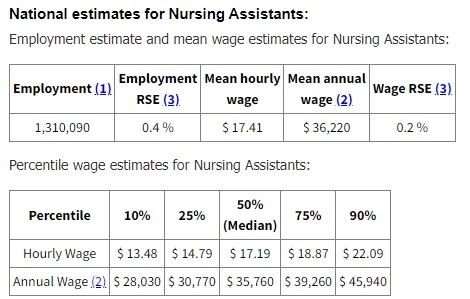Are you passionate about making a positive impact on people’s lives and contributing to the healthcare field in the states of Georgia?
Becoming a certified nursing assistant (CNA) is a great way to start a career in healthcare.
CNAs provide important hands-on patient care in hospitals, nursing homes, and other medical settings.
This complete guide covers everything you need to know about becoming a CNA.
What is a CNA?
A certified nursing assistant (CNA) is a healthcare professional who provides basic care to patients under the supervision of nurses and other medical staff.
CNAs assist with activities of daily living such as bathing, dressing, feeding, and transporting patients. They also take vital signs, help document patient care, and communicate with the care team.
CNAs provide an essential support role on the frontlines of patient care.
They work closely with patients and get to know them on an individual level.
For those interested in launching a career in nursing or healthcare, becoming a CNA is often the first step.
CNA Job Description and Duties
The day-to-day duties and responsibilities of a CNA can vary depending on the work setting but often include:

- Assisting patients with bathing, grooming, dressing, toileting, and other personal hygiene tasks
- Helping patients move around and transfer between beds, wheelchairs, etc.
- Turning and repositioning patients to prevent bedsores
- Taking vital signs like blood pressure, temperature, pulse, and respiration
- Documenting patient care and reporting updates to nurses
- Feeding patients and providing hydration
- Answering patient call lights promptly
- Observing patients and reporting any changes in condition
- Cleaning patient rooms and sanitizing medical equipment
- Transporting patients via wheelchair or stretcher
CNAs provide hands-on care and emotional support to patients. Strong interpersonal skills and compassion are essential. The role requires physical stamina as well.
CNA Salary and Job Outlook
According to the U.S. Bureau of Labor Statistics (BLS), the median annual salary for CNAs as of 2023 was $36,220.
The lowest 10% earned less than $23,000 and the highest 10% earned more than $48,000.

Employment of CNAs is projected to grow 9% from 2020-2030, faster than the average across all occupations.
Demand will increase with the aging population and the need for more healthcare workers in nursing homes and assisted living facilities.
CNA experience provides a good foundation for advancing your healthcare career. Many CNAs go on to become RNs or LPNs while continuing to work.
CNA Requirements and Training Programs
Though requirements vary by state, generally you must complete a CNA training program and pass a competency exam to earn certification.
Programs can be found at community colleges, vocational schools, hospitals, nursing homes, and other locations.

- CNA training programs last 4-12 weeks and include 60-120 hours of coursework and hands-on clinical practice.
- Classes cover topics like basic nursing skills, infection control, safety, communication, and more.
- Clinical rotations give students experience providing hands-on care in a healthcare setting.
- After completing training, students take a state exam to earn CNA certification. The exam has a written portion and a skills demonstration portion.
Many programs offer weekend, evening, or accelerated options to accommodate students’ schedules.
Costs vary but are generally affordable, often less than $1,500 total. Financial aid may be available.
Steps to Become a CNA
Follow these key steps to launch your CNA career:
1. Choose a Training Program
- Search for accredited programs in your area or online. Community colleges, vocational schools, hospitals, and nursing homes often offer programs.
- Make sure the program includes at least 75 hours of coursework and hands-on training.
- Check that it prepares you for your state’s CNA exam.
2. Enroll and Complete Training
- Enroll in your chosen CNA training program.
- Devote 4-12 weeks to complete coursework, skills labs, and clinical rotations.
- Study topics like patient hygiene, safety, vital signs, communication, nutrition, and more.
- Practice skills like bathing patients, making beds, taking vitals, etc.
- Get hands-on experience during supervised clinicals at a healthcare facility.
3. Apply for State Certification
- Apply to take your state’s CNA exam after finishing training.
- Submit a completed application, training documentation, fees, etc.
- Many states use the National Nurse Aide Assessment Program (NNAAP) exam.
- Test sites are located throughout the state on various dates.
4. Pass the Exam
- The CNA exam has two parts – a written portion and a skills evaluation.
- The written section tests your knowledge of basic nursing concepts.
- For the skills assessment, you’ll demonstrate competency in 5 randomly selected skills.
- Passing scores vary by state but average 70-80% overall.
5. Get Licensed
- After passing the exam, you’ll be officially certified as a CNA in your state.
- Your name will be added to the state’s CNA registry.
- Employers verify licenses by checking the registry.
- Renewal requirements vary but generally need to be completed every 1-2 years.
6. Search for CNA Jobs
- Start applying to CNA job openings in hospitals, nursing homes, home health agencies, and other healthcare settings.
- Look for roles in geriatrics, pediatrics, oncology, or other specialties that interest you.
- Newly certified CNAs are in high demand and can often find jobs quickly.
Becoming a CNA is a relatively fast, affordable way to begin a rewarding healthcare career.
With the right training and dedication, you can soon be providing essential care to patients as a certified nursing assistant.
FREQUENTLY ASKED QUESTIONS
Becoming a Certified Nursing Assistant is a noble and fulfilling career choice. If you want to pursue your career as a CNA in Atlanta, Georgia then you can take the first step on your journey with us. :)


